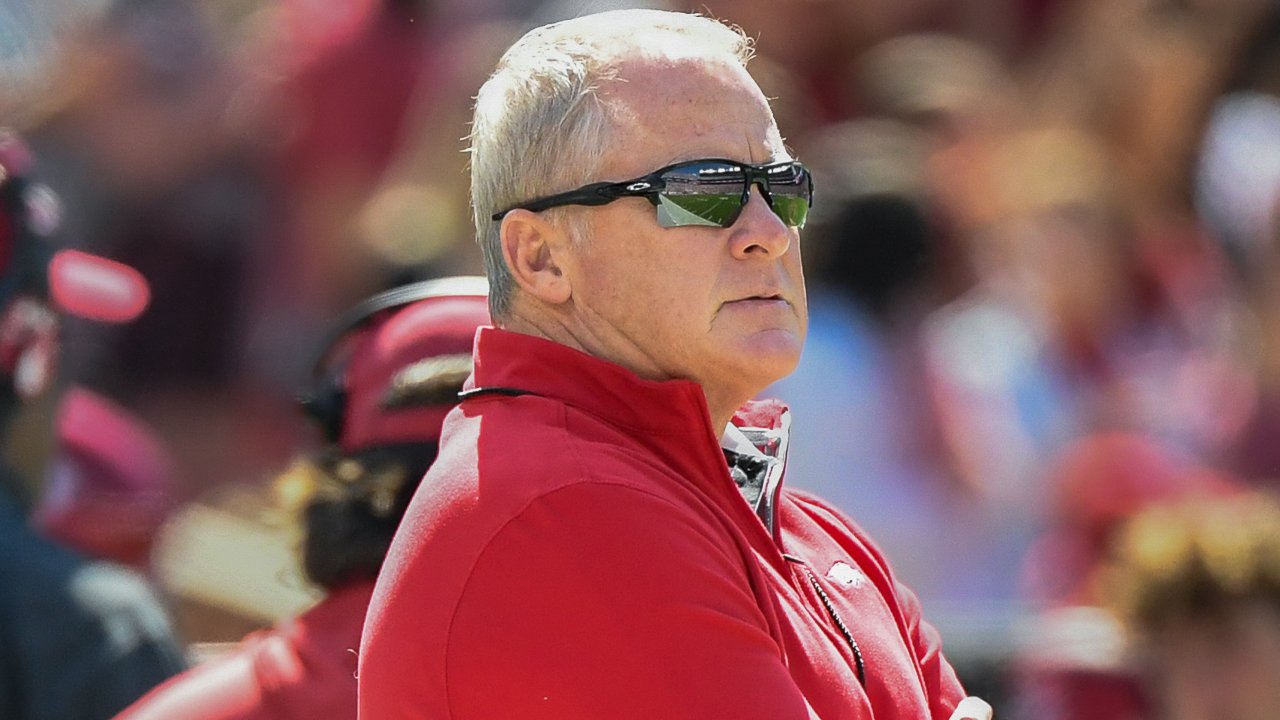For Arkansas Razorbacks football fans, patience is wearing thin. Since 2011, the Razorbacks have hovered around mediocrity, rarely breaking out of the six-to-eight win range.
This rut hasn’t gone unnoticed by national voices.
On his Adapt & Respond podcast, Fox Sports’ RJ Young called Arkansas “stuck in six, seven, eight-win purgatory,” capturing the frustration that’s seeped into Fayetteville.
Athletics director Hunter Yurachek, though, sees more to the story.
“I don’t think that we want to lie and say 7-6 is where we want to be as a football program,” Yurachek said on The Hog Pod with Bo Mattingly last week. “But as you look back on the 2018 and 2019 seasons, we were selling about 25,000 season tickets. We went 2-10 and didn’t win an SEC football game. Since that time, we’ve been to three bowl games.”
Yurachek points to growth with doubl the season ticket sales, exceeding $60 million in ticket revenue for the first time, and record TV revenue.
His tone also reflects the split-minded logic defining Arkansas’s current challenge—balancing competitive aspirations with harsh financial realities.
The SEC Scheduling Dilemma
The question of whether the SEC should add a ninth conference game looms large over every athletic department in the league.
For Arkansas, it’s a double-edged sword.
“Eight [SEC] games is best for the Arkansas football program,” Yurachek said. “Nine games is what’s best for the Arkansas operating budget.”
The SEC remains the only Power Four conference to stick with eight conference games, but the landscape is shifting.
After the recent House settlement, which approved revenue sharing with college athletes, Yurachek estimates Arkansas will need to close a $10-11 million gap to meet new financial obligations.
Football already drives roughly 75% of the athletic department’s revenue and every additional high-profile home game against an SEC opponent means another boost at the gate, albeit at the cost of a likely win and, potentially, bowl eligibility.
That tradeoff is more than theoretical. Substituting a guaranteed win against a non-conference “cupcake” for another SEC opponent could have meant missing out on bowl trips in recent 6-6 seasons.
Yet, with the pressure to fund new revenue sharing arrangements, schools like Arkansas may have little choice but to accept tougher schedules.
What If Arkansas Was in the Big 12?
Some fans, weary of annual grind-it-out campaigns against SEC heavyweights, muse about life in the Big 12.
The numbers don’t lie.
In 2024, SEC members each received $52.6 million in conference distributions, compared to $37.8–$42.1 million for Big 12 schools.
That extra cash has funded not just football, but Arkansas’s nationally competitive basketball and baseball programs.
As Yurachek and others have noted, the Razorbacks’ willingness to take their lumps on the gridiron has positioned the entire department to compete at the highest levels elsewhere.
The coaching carousel reflects this pressure.
After failed experiments with Bret Bielema’s Big Ten-style football and Chad Morris’s up-tempo offense, Sam Pittman has brought relative stability.
As RJ Young noted, though, it was “just enough” to keep his job last season.
The administration’s willingness to make bold, unconventional hires is a direct response to the SEC’s unforgiving environment.
Revenue Sharing: A New Era
The House settlement represents a watershed moment for college sports, with schools now obligated to share revenues directly with athletes.
For Arkansas, that means every ticket, every TV contract, and every bowl trip carries more weight.
Yurachek estimates the department still needs millions to fully fund the new system, making each football season a critical revenue engine for all sports.
Despite the struggles, Yurachek says fans can help.
“If you want to level the playing field, support the program,” he urges.
That means buying tickets, filling Razorback Stadium, and understanding just how much every dollar counts.
Looking Forward
The Razorbacks’ future remains uncertain.
The SEC’s push toward a bigger schedule, the realities of revenue sharing, and the ever-rising expectations of fans will keep Arkansas’s leadership balancing on a knife’s edge.
But it’s clear that football’s grueling schedule and financial muscle are the backbone of the entire program’s success.
As Yurachek framed it, sometimes “context matters.” For the Razorbacks, winning in the SEC isn’t just about the scoreboard—it’s about keeping the lights on for all of Arkansas athletics.








